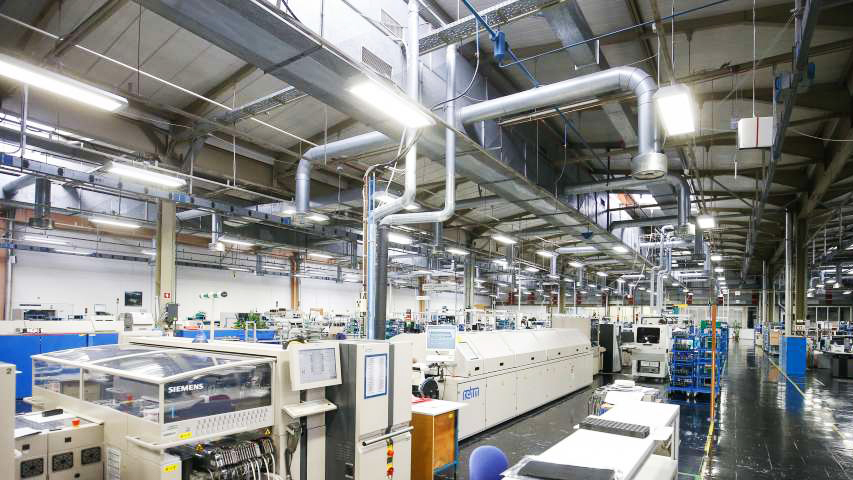Slovenian 5G smart factory passes INIR radiation test
A joint-venture from Telekom Slovenije and Iskratel showcases the future 5G smart factory, with radiation levels “far below” the levels set by the Institute for Non-Ionizing Radiation.

Telekom Slovenije, a leading communication service provider (CSP) in Slovenia and Kosovo, has partnered with digital transformation company Iskratel to build a 5G-enabled smart factory in Kranj, Slovenia.
The joint solution – known as a ‘campus network’ – has been set up at a production facility of telecoms equipment maker Iskratel, and is designed to enable the development of new business models, encompassing IIoT (industrial internet of things) and Industry 4.0. The new 5G infrastructure will connect a number of state-of-the-art virtual networks for individual business verticals, including smart factories: a key sector enabled by 5G, which will offer manufacturers and operators with significantly greater control and automation.
"I am very proud we have deployed a 5G network in our own business environment,” said Kristijan Melinc, Sales Director of BU Core at Iskratel. “We leveraged our expertise in Core networks and together with our partners shaped a complete solution that will allow us to address demands for campus networks in various industries. We were able to learn much more about the intricacies of 5G applications from our real-world installation rather than from theory or lab-style test projects."
Smart factories and 5G use cases
"“Artificial Intelligence alerts our staff of deviations from the optimal processes and workflows, well ahead of time. Therefore 5G increases the safety of our staff, as well as improving our bottom line."
Sašo Šimec, Iskratel.
Telekom Slovenije is a well-known operator in Slovenia, and had 1.75 million mobile customers in Slovenia and Kosovo at the end of March 2020 (slightly down from 1.82 million a year earlier, as a result of the coronavrius pandemic, the company said). And the company sees a major opportunity in enabling businesses to create their own 5G networks.
“We continue to develop the smart factory as a key 5G use case,” said Sašo Šimec, COO at Iskratel and EMS Business Unit director. “State-of-the-art connectivity is a cornerstone to establish this and links the real-time analogue world of the bustling factory with digital processing power that firmly resides in the cloud, as its nervous centre.
“Artificial Intelligence alerts our staff of deviations from the optimal processes and workflows, well ahead of time. Therefore 5G increases the safety of our staff, as well as improving our bottom line. We are convinced the essential building blocks of this solution can be reused in other industry verticals and deliver similar value to different kinds of operations,” Šimec added.
Aware of radiation concerns
"The results of the measurements show that the radiation exposure at all measuring points is far below the warning values set by the regulations on the protection of workers from the risks related to exposure to electromagnetic radiation."
Tomaž Tercek, INIR.
Aware of the concerns around 5G radiation, which have been heightened during the Covid-19 pandemic, the development team has done everything it can to alleviate any safety concerns potential partners may have, and the companies have worked with the Institute for Non-Ionizing Radiation (INIR), an independent and accredited national organisation, to perform measurements of electromagnetic radiation of the 5G base station in Iskratel's production facilities.
SIGN UP FOR E-MAIL NEWSLETTERS
Get up to speed with 5G, and discover the latest deals, news, and insight!
Measurements were performed at maximum base station traffic, with four test terminals that simultaneously performed a data rate test at the time of the measurements.
"The results of the measurements show that the radiation exposure at all measuring points is far below the warning values set by the regulations on the protection of workers from the risks related to exposure to electromagnetic radiation and the values set by Council Recommendation 1999/519/ES on limiting exposure to electromagnetic radiation (about Hz to 300 GHz),” explained Tomaž Tercek, INIR.
A 5G network testbed for smart factories will enable the development of new and innovative mobile ICT solutions across a number of different industry verticals.
“We plan the public mobile network in such a way that within one smart physical infrastructure we will enable state-of-the-art virtualised networks for different verticals - in different ways - as fully virtualised or as a hybrid public-private, so called "campus" network,” explained Šimec. “With Iskratel, we have established a reference case in which we will be able to test different capabilities, implementations and new ideas for new opportunities on specific use cases."
- Discover the best 5G networks in the UK and US
- Get your hands on the hottest 5G phones
- Millimeter wave: the secret sauce behind 5G
- The complete guide to 5G security
- We reveal the latest 5G use cases
- Discover the truth behind 5G dangers
- 5G towers: everything you need to know
Dan is a British journalist with 20 years of experience in the design and tech sectors, producing content for the likes of Microsoft, Adobe, Dell and The Sunday Times. In 2012 he helped launch the world's number one design blog, Creative Bloq. Dan is now editor-in-chief at 5Gradar, where he oversees news, insight and reviews, providing an invaluable resource for anyone looking to stay up-to-date with the key issues facing 5G.

